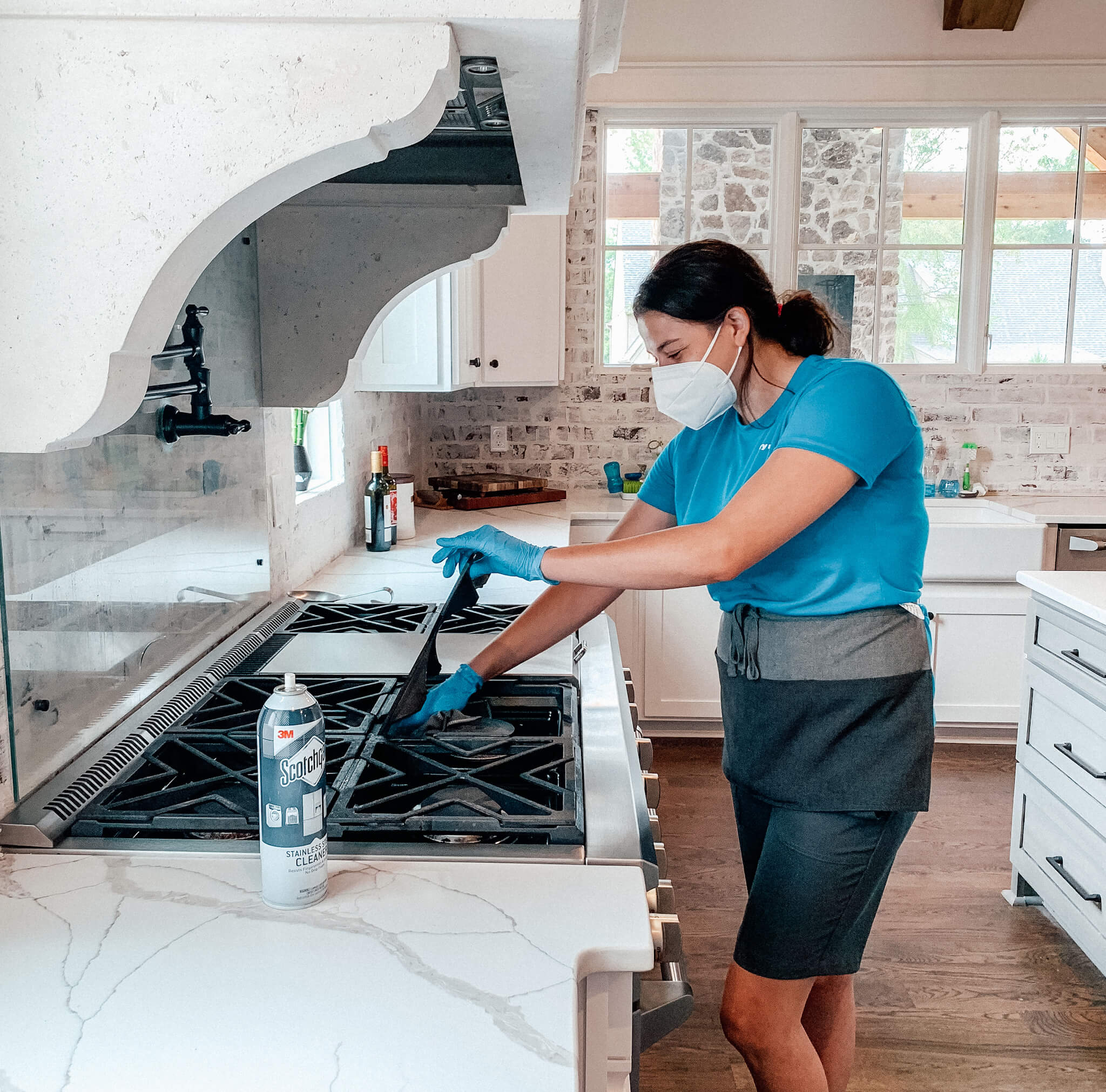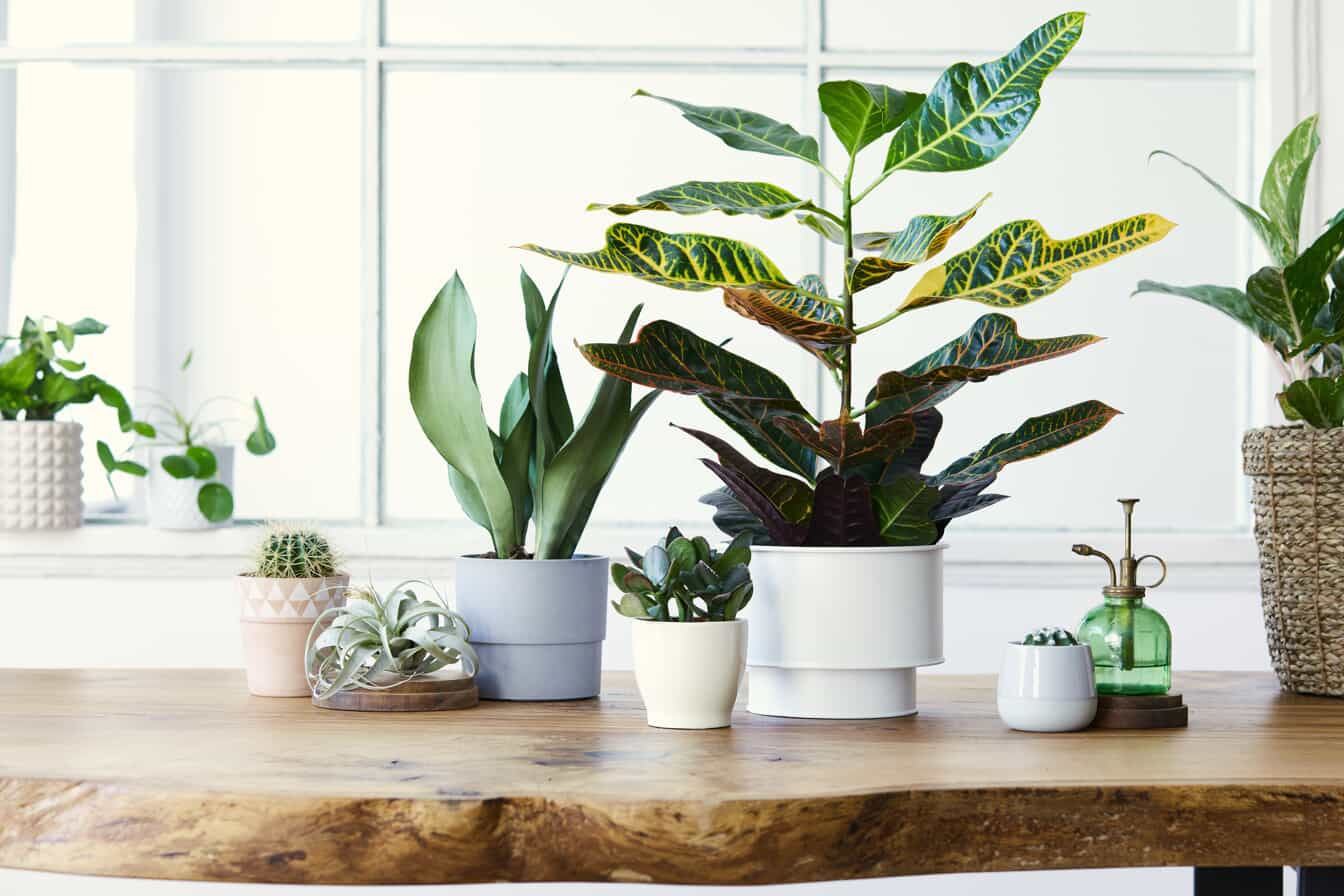How to Clean Up Grease & Other Cooking Stains
As Thanksgiving approaches, many a home cook begins thinking ahead and planning out the holiday menu. The turkey, the stuffing, the pumpkin pie—and the messy kitchen that goes along with them. This year, our cleaning experts at Merry Maids® put together a cheat sheet for cleaning splattered grease off the stove, removing butter stains from clothing, and more. Even if your festivities are a bit more subdued this year than they usually are, these tips are useful all year round!
Cleaning Grease Off of the Stove
When you’re cooking on the stove, it’s basically inevitable: Grease will splatter. What is the best way to clean up grease from a stovetop and what cuts through baked-on grease? Here’s a breakdown, depending on what type of stovetop you have.
Gas Stovetop:
Remove the burner grates and let them soak in a sinkful of hot soapy water.
Use a damp cloth to wipe down the stovetop to remove any crumbs or food particles.
Rinse the cloth in hot water and add a little dish soap, then go over the stovetop again, this time scrubbing to remove any remaining residue.
For stubborn, baked-on grease, create a paste of 2 parts baking soda to 1 part vinegar.
Apply it to the affected areas and let sit for 10-15 minutes, then gently scrub.
Wipe clean with a damp cloth.
Use a soft scrub brush to clean off any leftover grime on the burner grates.
For particularly soiled grates, you can soak them in vinegar for several hours or overnight. (Hint: Try placing them in large food storage bags, adding vinegar, and sealing shut.)
Dry all components with a clean cloth or allow to air dry, then replace burner grates.
Electric Coil Stovetop:
Start by removing any pots, pans, or cookware from the stove and turning burners to high for about 5 minutes. This should burn off most, if not all, of the residue on the burner coils. Turn off heat and let them cool completely before proceeding. If the burner coils don’t seem too soiled, you can skip this heating step.
Once burners are completely cooled, remove them and set aside. Most plug into a socket in the stove much like a plug in a wall outlet, so they should come out fairly easily.
Remove drip pans and set them to soak in a sinkful of warm soapy water.
Use a soft scrub brush to eliminate any stuck-on food particles from burner coils. Alternatively, you can use a soft cloth dampened with soapy water. Never submerge or soak electric burner coils, especially the connector prongs.
For seriously stubborn stains, add warm water to baking soda until it forms a paste. Apply it to the burnt-on grime and let it sit for a few minutes, then gently scrub. Remove thoroughly with a damp cloth.
Wipe down stovetop with a soft microfiber cloth and hot soapy water, taking care not to drip onto the open sockets.
Raise stovetop to check for any grease spills or splatters underneath the burner area and carefully wipe them up with your microfiber cloth.
Wash, rinse, and dry drip pans and replace them, then reattach burner coils.
Glass Stovetop:
Flat glass-top stoves are generally easier to keep clean thanks to their sleek, level surface—as long as you are diligent about wiping them down after every use. Simply wait until the burners have completely cooled, then wipe down with a soft microfiber cloth dampened with either water or vinegar. Make sure not to use abrasive scrub brushes or scouring pads, as this can scratch the surface. To make the glass-top gleam, we like Scotch-Brite™ Glass Cooktop Rejuvenator Polish, a no-scratch, water-based cleaner and polisher that’s phosphate-free. You can also check out our article on how to clean a glass-top stove for DIY deep-cleaning methods!
Pro tip: Have a stainless steel stove? Scotchgard™ Stainless Steel Cleaner not only removes fingerprints and smudges from stainless steel appliances but helps resist them in the future!
Removing Oil & Butter Stains from Clothes
Cooking splatters are rarely predictable. That’s why aprons and splatter screens were invented! However, if your clothes end up getting splashed with butter or oil, don’t fret. Dab the stain with a napkin or paper towel right away but avoid rubbing, as this can push the oil deeper into the fibers. If possible, sprinkle cornstarch, baking soda, or talcum powder on the stain and allow it to sit for 15 minutes or more to absorb the oil, then gently brush it away with a soft brush.
Next, pretreat the stain (or do this right away, if you skip the powder step) with a stain remover or even a few drops of grease-cutting liquid dish soap. Wait at least 15 minutes to give the stain treatment time to break down the oil, then wash the garment in the hottest water recommended on the care label.
Don’t put the garment in the dryer until you’ve inspected it and determined the stain is gone. The heat from the dryer can permanently set oil, grease, and butter stains. If the spot is still there, repeat the pretreatment and laundering process. If it’s gone, dry as usual.
Getting Out Food Stains from Kitchen Countertops
Most kitchen countertops are designed specifically to resist food stains—but that doesn’t mean they don’t happen. For instance, when unprotected, stone materials like granite or marble can absorb unaddressed spills and leave a stain in as little as 15 to 30 minutes, so your best bet is to sop up spills quickly. Laminate counters are particularly durable, but they can still collect stains over time.
The methods for cleaning cooking stains from countertops are fairly similar for most materials, though you’ll want to avoid abrasive cleaners that can scratch the surface and invite bacteria, dirt, and food remnants to hang around.
To remove stains from marble, granite, laminate, or stainless steel countertops:
Begin by wiping down the surface with a soft cloth dampened with warm soapy water.
Create a paste of baking soda and water, then apply to the stained area.
For marble and granite, cover with plastic wrap, tape down the edges, and let sit for several hours to a few days; for laminate, let it sit uncovered for about 5 minutes; for stainless steel, use a soft cloth to rub it gently in the direction of the grain.
When the time is up, carefully wipe up the paste with a soft, moistened cloth.
If the stain remains, repeat the process.
You can also use a countertop cleaner like Scotchgard™ Premium Countertop Cleaner & Protector, which is safe for use on most counter surfaces and adds an extra layer of resistance against future spills and stains. Plus, it’s ammonia- and phosphorus-free!
Has holiday cooking sapped your energy? Merry Maids® can help you reclaim your time by taking care of the house cleaning! Request your free service estimate today.













